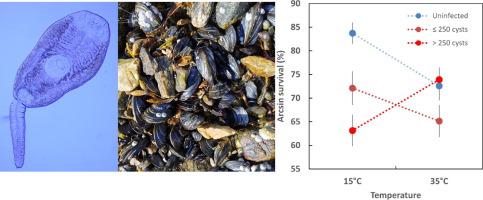International Journal for Parasitology ( IF 4 ) Pub Date : 2020-08-29 , DOI: 10.1016/j.ijpara.2020.07.006 Christian Selbach 1 , Martin Barsøe 2 , Trine K Vogensen 2 , Anne B Samsing 1 , Kim N Mouritsen 1

|
Blue mussels (Mytilus edulis) are important ecosystem engineers along Atlantic coastlines, where they are regularly subjected to rapid changes in temperature during the transition between tides. Global climate change and more frequent extreme weather events are expected to intensify this thermal stress even further. These increases in temperatures will not only affect intertidal mussels directly but also increase transmission dynamics of their parasites. Together, the effects of rises in temperature and parasitism will likely result in higher pressure on M. edulis and their ability to perform vital ecosystem services. In a set of experiments, we tested the effects of infections with the trematode Himasthla elongata and high temperatures during low tide air-exposure. Overall, we hypothesised that temperature and parasite infection intensity would each have significant negative effects on M. edulis survival, and that both stressors together would have a synergistic detrimental impact. Overall, high temperature levels had a strong negative effect on mussel survival. However, our results revealed a surprisingly more complex picture in infected individuals. While moderate parasite loads and increased temperature showed additive negative effects on mussel survival, high parasite infection intensities appeared to nullify the detrimental effects of temperature stress on mussels. Under climate warming, these benefits of parasites might actually outweigh the costs of infection and prove beneficial. Overall, these results suggest that the interactions between host–parasite systems and their changing environment are much more complex than a simple additive effect of multiple stressors.
中文翻译:

温度-寄生虫相互作用:吸虫感染能防止热应激吗?
蓝贻贝(Mytilus edulis)是大西洋沿岸重要的生态系统工程师,在潮汐转换期间,它们经常受到温度的快速变化。预计全球气候变化和更频繁的极端天气事件将进一步加剧这种热应力。这些温度升高不仅会直接影响潮间带贻贝,还会增加其寄生虫的传播动态。总之,温度升高和寄生的影响可能会对M. edulis及其执行重要生态系统服务的能力造成更大的压力。在一组实验中,我们测试了吸虫Himasthla elongata感染的影响和低潮空气暴露期间的高温。总的来说,我们假设温度和寄生虫感染强度都会对M. edulis产生显着的负面影响生存,并且两个压力源一起会产生协同的不利影响。总体而言,高温水平对贻贝的存活产生了强烈的负面影响。然而,我们的结果揭示了受感染个体的惊人复杂情况。虽然适度的寄生虫负载和升高的温度对贻贝存活有额外的负面影响,但高寄生虫感染强度似乎可以抵消温度压力对贻贝的不利影响。在气候变暖的情况下,寄生虫的这些好处实际上可能超过感染的成本并证明是有益的。总体而言,这些结果表明宿主 - 寄生虫系统与其不断变化的环境之间的相互作用比多个压力源的简单累加效应复杂得多。



























 京公网安备 11010802027423号
京公网安备 11010802027423号